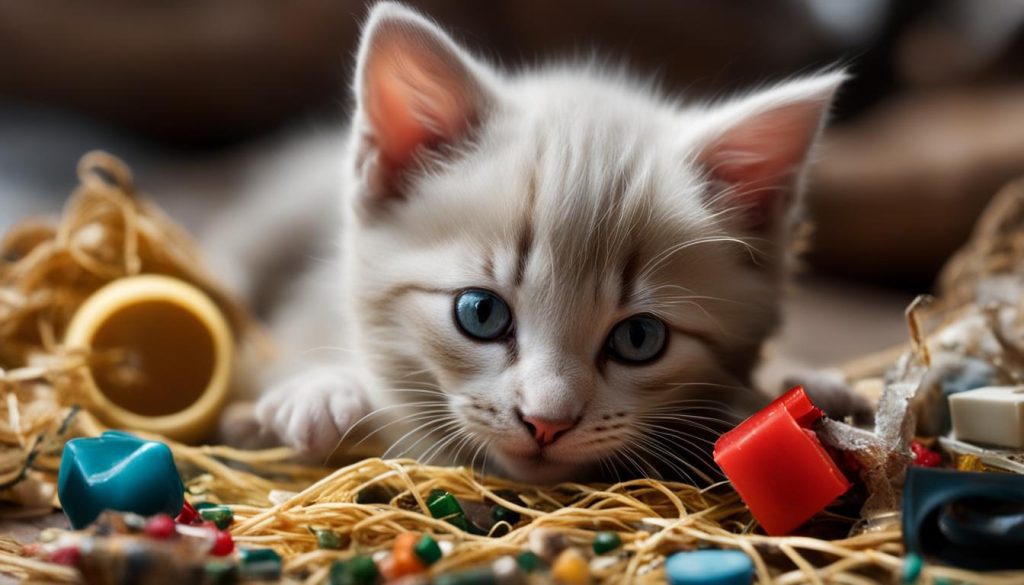Giving your new kitten the best care possible is every pet owner’s priority. However, it’s important to be aware that kittens are susceptible to various common illnesses and health issues. In order to provide the necessary care and ensure their well-being, it’s crucial to understand the symptoms and know how to handle these illnesses effectively. Let’s explore some of the most common health problems in kittens and learn valuable tips for their healthcare.
When it comes to kitten ailments, there are a few prevalent feline diseases you should be familiar with. Being proactive in preventing these illnesses and being attentive to early signs of any problems can make a significant difference in your kitten’s health and overall quality of life.
- Understanding common illnesses in kittens is crucial for providing adequate care.
- Be proactive in preventing feline diseases and observing early symptoms.
- Regular check-ups and vaccinations are essential for your kitten’s well-being.
- Proper parasite prevention and a balanced diet contribute to a healthy kitten.
- Creating a clean and safe environment promotes your kitten’s overall health.
Upper Respiratory Infections in Kittens
Upper respiratory infections can be a common occurrence in kittens, causing discomfort and concern for pet owners. These infections are often caused by viruses, including the feline herpes virus and feline calicivirus. Kittens may also develop bacterial respiratory infections, leading to additional symptoms and the need for specialized treatment.
Kittens with upper respiratory infections may exhibit symptoms such as frequent sneezing, nasal discharge, and conjunctivitis. Their eyes may appear red and inflamed, and they may experience difficulty breathing due to congestion. In some cases, kittens may develop a low-grade fever as their bodies fight off the infection.
It is crucial to monitor kittens with respiratory infection symptoms closely, as their condition can deteriorate rapidly. If a kitten stops eating, shows signs of labored breathing, or continues to experience conjunctivitis, seeking immediate veterinary care is essential. A veterinarian can provide a proper diagnosis and determine the most suitable treatment plan.
When it comes to viral respiratory infections, such as feline herpes and calicivirus, treatment typically focuses on managing the symptoms and supporting the kitten’s immune system. This may involve providing fluids to prevent dehydration, using eye drops to alleviate discomfort, and administering antiviral medications.
In the case of bacterial respiratory infections, antibiotics may be prescribed to help eliminate the infection. It is crucial to complete the full course of antibiotics as prescribed by the veterinarian to ensure that the infection is completely eradicated and to prevent the development of antibiotic resistance.
Preventing the spread of upper respiratory infections in kittens is also essential. If a kitten in a multi-cat household is diagnosed with a viral respiratory infection, it is crucial to separate them from other cats to prevent the spreading of the virus. Proper hygiene practices, such as regular handwashing and disinfecting surfaces, can also help minimize the risk of transmission.
By recognizing the symptoms and seeking timely veterinary care, pet owners can ensure the well-being and prompt recovery of their kittens from upper respiratory infections. Taking preventive measures and providing appropriate treatment are crucial steps in promoting the overall health and happiness of kittens.
Gastrointestinal Issues in Kittens
Kittens can experience gastrointestinal issues, such as upset stomach and diarrhea. These issues can be distressing for both the kittens and their owners. It is important to understand the causes of these problems and how to address them effectively.
Causes of Gastrointestinal Problems in Kittens
Gastrointestinal issues in kittens can arise from various factors. One common cause is intestinal parasites. Kittens are often affected by worms, such as roundworms and hookworms, which can lead to digestive disturbances. Infections, both viral and bacterial, can also cause gastrointestinal problems in kittens.
In addition, foreign body ingestion is another possible cause. Kittens, being naturally curious, may swallow objects that can obstruct their digestive system, leading to stomach upset and diarrhea. Lastly, dietary changes, especially transitioning to a new food too quickly, can trigger gastrointestinal issues in kittens.
Symptoms and Treatment
Kittens with gastrointestinal issues may exhibit symptoms such as vomiting, loose stools, or even bloody diarrhea. They may also show signs of discomfort, such as abdominal pain or decreased appetite. If you notice these symptoms in your kitten, it is crucial to consult a veterinarian.
Treatment for gastrointestinal problems in kittens may vary depending on the underlying cause and severity of the symptoms. Mild cases of upset stomach can often be managed at home with a temporary switch to a bland diet, such as boiled chicken and rice, to calm the stomach. However, if the symptoms worsen or persist, veterinary care should be sought.
A veterinarian will be able to diagnose the exact cause of the gastrointestinal issues and recommend appropriate treatment. This may include deworming medications, antibiotics for infections, or removing any foreign objects through surgery, if necessary. They can also provide guidance on dietary adjustments, such as a gradual transition to a new food, to prevent further digestive disturbances.
Foreign Material Ingestion in Kittens
Kittens are naturally curious and prone to exploring their surroundings with their mouths. As a result, they may accidentally swallow foreign objects, such as string, hair ties, or rubber bands. While it may seem harmless, foreign material ingestion can actually pose serious risks to a kitten’s health.

Dangers of Swallowing Foreign Objects
Swallowing foreign objects can lead to internal damage in kittens. Sharp objects like pins or needles can puncture the gastrointestinal tract, causing severe pain and even life-threatening complications. String-like objects, on the other hand, can become stuck in the intestines and cause a dangerous condition called intestinal obstruction.
Foreign material ingestion can also lead to an increased risk of infections or obstructions. Kittens may develop bacterial infections if the foreign object introduces harmful bacteria into their digestive system. Additionally, objects that do not pass through the digestive tract normally can cause blockages, resulting in a complete obstruction of the intestines.
Signs of Foreign Material Ingestion in Kittens
It is crucial for pet owners to be aware of the signs that indicate a kitten has ingested a foreign object. Some common signs of foreign material ingestion in kittens include:
- Decreased appetite
- Vomiting
- Diarrhea
- Gagging or retching
- Lethargy
If you notice any of these signs in your kitten, it is important to seek immediate veterinary care. Timely intervention can help prevent complications and ensure the safe removal of the foreign object if necessary.
Urinary Tract Issues in Kittens
Kittens, like humans, can experience urinary tract issues that may include urinary tract infections (UTIs) and urinary blockages. These conditions require prompt veterinary care to ensure the health and well-being of your furball.
One common urinary tract issue in kittens is a urinary tract infection. UTIs can cause discomfort and distress for your little one. Some symptoms of urinary tract infections in kittens include frequent urination, straining to urinate, blood in the urine, and urinating outside the litter box.
Urinary blockages are another concern for kittens. A urinary blockage can lead to an inability to urinate or vocalizing in the litter box. It is crucial to recognize the signs of urinary blockages, as this condition can be life-threatening.
If you notice any symptoms of urinary tract issues in your kitten, it is important to consult a veterinarian immediately. A veterinarian can diagnose the problem and provide appropriate treatment. UTIs are typically treated with antibiotics, while urinary blockages may require catheterization or even surgery to remove the blockage.
Preventing Urinary Tract Issues in Kittens
While it is not always possible to prevent urinary tract issues in kittens, there are some steps you can take to minimize the risk:
- Provide fresh water at all times to ensure proper hydration.
- Offer a balanced and high-quality diet formulated for kittens.
- Keep the litter box clean and accessible to encourage regular urination.
- Monitor your kitten’s litter box habits and seek veterinary attention if you notice any changes.
By being proactive in your kitten’s care and seeking veterinary assistance at the first sign of urinary tract issues, you can help ensure that your furry friend stays happy and healthy.
Parasitic Infections in Kittens
Kittens are highly susceptible to parasitic infections, which can have detrimental effects on their health and well-being. It is crucial for pet owners to be aware of the different types of parasites that commonly affect kittens, such as intestinal worms, fleas, and ear mites.
Intestinal worms are a common parasitic infection in kittens and can be acquired from the mother during birth or through contaminated environments. These worms can cause various symptoms, including diarrhea, vomiting, weight loss, and a bloated appearance. If left untreated, intestinal worms can severely impact a kitten’s overall health and development.
Flea infestations are another prevalent issue in kittens. Fleas can cause extreme discomfort by biting, irritate the skin, and lead to itching and hair loss. Moreover, fleas can transmit diseases and even cause anemia in severe cases. It is essential to implement effective flea prevention measures and consult a veterinarian for appropriate treatment.
Ear mites are another common parasitic infection seen in kittens. These microscopic parasites inhabit the ears and can cause irritation, inflammation, and persistent scratching. Without prompt treatment, ear mites can lead to secondary infections and discomfort for the kitten. Veterinarians can recommend appropriate ear mite treatments to alleviate the symptoms and eradicate the infestation.
If you suspect that your kitten may have a parasitic infection, it is vital to seek veterinary care promptly. A veterinarian can accurately diagnose the specific type of parasite and prescribe the necessary treatment, which may include deworming medications, flea prevention products, or ear mite treatments.
Common symptoms of parasitic infections in kittens include:
- Diarrhea
- Vomiting
- Weight loss
- Itchiness and scratching
- Visible worms in stool
- Hair loss
- Irritated or inflamed ears
Regular check-ups with a veterinarian, appropriate preventive measures, and a clean living environment can help protect kittens from parasitic infections. By ensuring their well-being and health, pet owners can provide the best possible care for their adorable feline companions.
Conclusion
As responsible pet owners, it is essential for us to prioritize the health and well-being of our kittens. By staying informed about the common illnesses and their symptoms, we can take prompt action and seek veterinary care when necessary. Regular check-ups and vaccinations are crucial in preventing and managing common health problems in kittens.
In addition to veterinary care, there are several care tips that can contribute to the overall health of our little feline friends. Providing a clean and safe environment, free from hazards and potential sources of infection, is important. A balanced diet that meets their nutritional needs is vital for their growth and development. Offering them plenty of love and attention helps create a stress-free environment.
Furthermore, proper parasite prevention is key in ensuring good kitten health. Regular deworming and flea prevention are essential to protect them from internal and external parasites. By implementing these preventative measures, we can reduce the risk of illness in our kittens and promote their overall well-being.
FAQ
What are some common illnesses in kittens?
Common illnesses in kittens include upper respiratory infections, gastrointestinal issues, foreign material ingestion, urinary tract issues, and parasitic infections. These can be caused by viruses, bacterial infections, parasites, and other factors.
What are the symptoms of upper respiratory infections in kittens?
Symptoms of upper respiratory infections in kittens include sneezing, nasal discharge, conjunctivitis, and difficulty breathing. If a kitten stops eating or shows signs of severe symptoms, veterinary care should be sought.
What can cause gastrointestinal issues in kittens?
Gastrointestinal issues in kittens can be caused by factors such as intestinal parasites, infections, foreign material ingestion, and dietary changes. Mild cases can be treated at home with a bland diet, but severe symptoms require veterinary care.
What are the signs of foreign material ingestion in kittens?
Signs of foreign material ingestion in kittens include decreased appetite, vomiting, diarrhea, gagging, and lethargy. Immediate veterinary care is necessary if a kitten is suspected to have swallowed a foreign object.
What are the symptoms of urinary tract issues in kittens?
Symptoms of urinary tract issues in kittens can include frequent urination, straining to urinate, blood in the urine, and urinating outside the litter box. Veterinary care is required for diagnosis and treatment of urinary tract infections and blockages.
What are common symptoms of parasitic infections in kittens?
Common symptoms of parasitic infections in kittens include diarrhea, vomiting, weight loss, and itchiness. Intestinal worms, fleas, and ear mites are common parasites that affect kittens.
How can I prevent illnesses in kittens?
To prevent illnesses in kittens, it is important to schedule regular check-ups with a veterinarian, ensure vaccinations are up to date, provide proper parasite prevention, maintain a clean and safe environment, and offer a balanced diet. Lots of love and attention also contribute to the overall well-being of a kitten.






